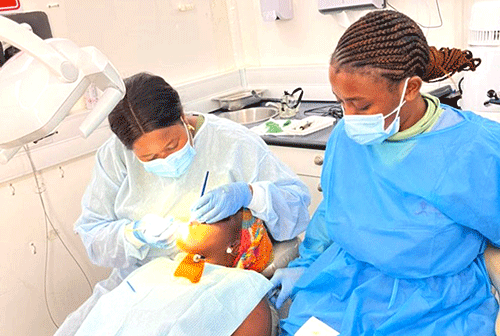Eveline de Klerk
Paheja Siririka
WALVIS BAY – Oral health goes beyond just having a beautiful smile, as it encompasses the prevention, early detection and treatment of oral diseases, which can impact not only one’s physical health, but also their emotional and psychological well-being.
To create awareness of oral health, the Erongo region is participating in a campaign from 9 to 20 September 2024 as part of Oral Health Awareness Week.
The campaign aims at educating residents in both urban and rural areas about the significance of maintaining good oral hygiene practices. This week, residents can consult with dental experts in Walvis Bay at no cost.
“We all know that untreated oral health issues can lead to other serious health conditions, such as cardiovascular diseases, diabetes and respi r ator y i n fect ions ,” said Erongo governor Neville Andre during the launch of the campaign.
“Promoting oral health in schools is not a new concept, and it was advocated for through the National Oral Health Programme policy and guidelines, as well as the National Guidelines on Oral Health Service Delivery,” he noted.
He said this advocacy led to the implementation of the Smiling Schools Project, which was implemented countrywide, and was later incorporated into the School Health Programme to streamline the services offered at schools with minimal interruption.
He added that these policies ensured that children screened at schools and referred for dental treatment to public health facilities would be seen at no cost.
Over the years, a marked decrease in visits to schools was recorded, solely due to the skeletal staff structure in the region as well as an increased demand for curative services at the main sites.
Dental service provision in the Erongo region relied on outreach services from the only two districts that rendered full-time services, namely Walvis Bay and Swakopmund district hospitals.
“This meant that preventative dentistry in the community was neglected. However, it is noteworthy to mention the strides the health ministry made in strengthening dental services in the region,” he said. He said full-time dental services were extended to Omaruru and Usakos districts in 2017.
Skilled dental professionals were recruited at all four district hospitals, and at facilities where staff shortages existed.
Supplementation through the Cuba-Namibia bilateral agreement was actioned.
Additionally, the provision of functional equipment to the facilities resulted in various restorative treatment modalities being readily available as treatment options for patients.
Outreach in Erongo
To complete the outreach services, the ministry requested that the dental clinic on wheels from the national level be utilised in the region as part of the commemoration.
The commu n it i e s of Ui s , Okombahe, Kar ibib and Otjimbingwe have so far benefitted from services rendered through the presence of the dental truck such as scaling, polishing and tooth restorations, amongst other services.
This week, services are being rendered in Walvis Bay and Swakopmund.
“With the campaign, we aim to strengthen awareness about services available, educate on oral health and increase our reach by bringing services to the community. Services offered range from tooth fillings, cleaning and extraction – but mostly concentrate on restoration. Common problems include dental caries,” said Erongo health director Anna Jonas in an interview with Vital Signs yesterday.
Dental caries is a major public health problem globally, and the most widespread non-communicable disease.
It can be prevented by avoiding dietary free sugars. Moreover, dental caries is largely preventable through simple and cost-effective population-wide and individual interventions.
Treatment is costly, and is often unavailable in low- and middle-income countries. Teeth affected by caries are often extracted (pulled out) when they cause pain or discomfort.
Severe dental caries can impair quality of life, including difficulties in eating and sleeping. In its advanced stages (abscesses), it may result in pain and chronic systemic infection or adverse growth patterns.
T he Wo rl d He a l t h Organisation also states that oral diseases disproportionately affect the most vulnerable and disadvantaged populations. People of low socio-economic status carry a higher burden of oral diseases, and this association remains across the life course – from early childhood to older age – regardless of the country’s overall income level. -edeklerk@nepc.com.na


